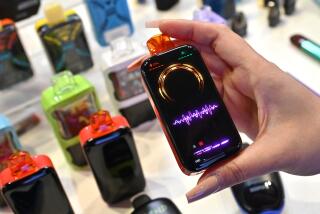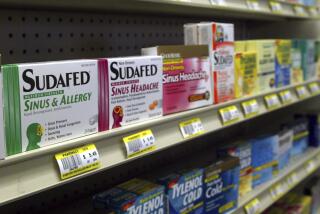FDA Panel Cites Possible Abuse of Nicotine Spray : Regulation: Advisory group says that for some people, experimental nasal therapy can be as addictive as cigarettes. Strict controls are urged.
- Share via
WASHINGTON — An experimental nicotine nasal spray designed to help smokers quit cigarettes can be just as difficult for some to stop using as cigarettes, a federal advisory panel said Monday--a conclusion that likely will weigh heavily in the current debate over regulating cigarettes.
The Food and Drug Administration’s drug abuse advisory committee, which today will directly address the issue of whether nicotine is addictive and at what doses, said that the nasal spray has significant potential for abuse. It recommended that it be strictly controlled, if approved.
Committee members urged that the spray be available only by prescription, and that the label carry strong warnings about potential abuse. They also recommended that there be a limit on the number of refills available to users.
The panel Monday listened to considerable data about nicotine withdrawal, as well as more than a dozen case studies of patients in research studies who were able to give up cigarettes by using the spray--but then did not want to give up the spray.
“We’re worried that we have found a new dosage form for an old drug of abuse,” said Dr. E. Douglas Kramer of the FDA, who examined the histories of patients in one study who quit smoking but who could not give up the spray.
The deliberations were significant because the agency, which has regulatory authority over drugs, has been steadily building a case in recent months that cigarettes are, essentially, drug delivery systems--with nicotine as the drug.
The agency already regulates nicotine in smoking cessation products but has never before attempted to regulate cigarettes.
If the panel Tuesday concludes that nicotine is indeed an addictive drug--and that the levels found in cigarettes are addictive--this almost certainly will open the way for the agency to act against cigarettes.
For the last six months, the FDA has waged an intense investigation into nicotine, tobacco and the cigarette industry to determine whether companies control and manipulate nicotine levels to keep smokers hooked.
Industry officials repeatedly have denied they control nicotine in cigarettes for this reason. They have said they do adjust levels of nicotine, but only to maintain taste and flavor and to achieve consistency in individual brands.
They also have said they believe nicotine is not an addictive substance.
Research has associated nicotine with heart disease and has shown that it affects the brain and the fetus.
The debate over nicotine replacement products often has focused on whether users simply trade one harmful habit for another.
The health dangers from cigarettes, however, which include lung cancer, emphysema and other respiratory ailments and heart disease, come less from nicotine than from inhaling the toxic substances produced by burning the tobacco leaf.
Dr. Richard Hurt, who runs a smoking cessation program at the Mayo Clinic in Rochester, Minn., said the symptoms of nicotine withdrawal can include depressed mood, insomnia, irritability, frustration and anger, anxiety, difficulty concentrating, restlessness, decreased heart rate and increased appetite and weight gain.
The FDA’s Kramer told of patients who suffered nosebleeds and nasal ulcers, but still resisted stopping the spray and of one woman who “can’t bear the thought of being without it.” After eight months of therapy, she had “no temptation to smoke, but (was) hooked on spray,” he said.
The spray differs from current prescriptive nicotine therapies, such as nicotine chewing gum and the nicotine patch. In the spray, nicotine is more rapidly absorbed and in greater concentrations--similar to cigarettes--although individuals metabolize drugs in different ways and at different rates.
One dose--two sprays--of the drug delivers 1 milligram of nicotine.
The average cigarette, regardless of whether it is a “light” version or a regular, contains from 7 to 9 milligrams of nicotine.
More to Read
Sign up for Essential California
The most important California stories and recommendations in your inbox every morning.
You may occasionally receive promotional content from the Los Angeles Times.













